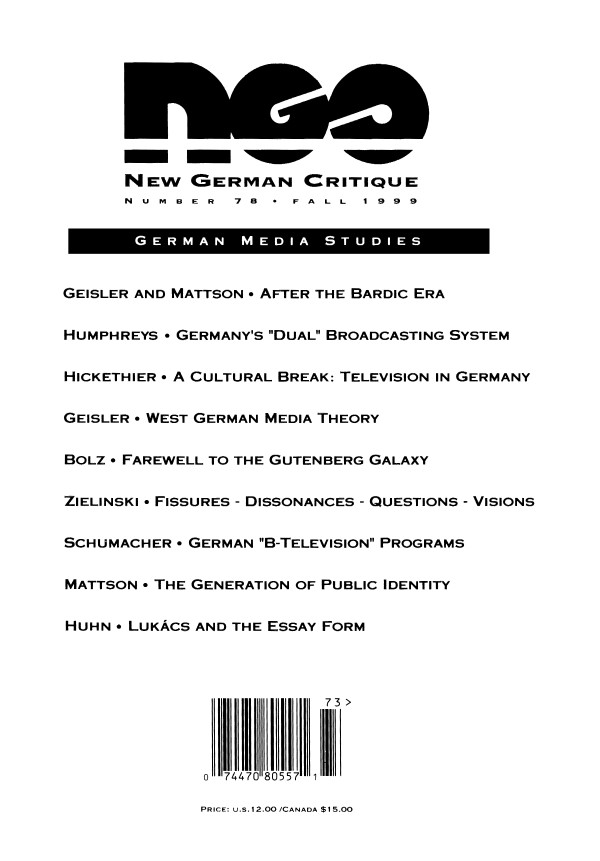Andreas Killen: Berlin Electropolis: Shock, Nerves, and German Modernity (2006)
Filed under book | Tags: · 1880s, 1890s, 1900s, 1910s, berlin, city, electricity, germany, history, modernity, neurasthenia, psychiatry, telephone, weimar republic

“Berlin Electropolis ties the German discourse on nervousness in the late nineteenth and early twentieth centuries to Berlin’s transformation into a capital of the second industrial revolution. Focusing on three key groups—railway personnel, soldiers, and telephone operators—Andreas Killen traces the emergence in the 1880s and then later decline of the belief that modernity caused nervous illness. During this period, Killen explains, Berlin became arguably the most advanced metropolis in Europe. A host of changes, many associated with breakthroughs in technologies of transportation, communication, and leisure, combined to radically alter the shape and tempo of everyday life in Berlin. The resulting consciousness of accelerated social change and the shocks and afflictions that accompanied it found their consummate expression in the discourse about nervousness.”
Wonderfully researched and clearly written, this book offers a wealth of new insights into the nature of the modern metropolis, the psychological aftermath of World War I, and the operations of the German welfare state. Killen also explores cultural attitudes toward electricity, the evolution of psychiatric thought and practice, and the status of women workers in Germany’s rapidly industrializing economy. Ultimately, he argues that the backlash against the welfare state that occurred during the late Weimar Republic brought about the final decoupling of modernity and nervous illness.
Publisher University of California Press, 2006
Weimar and Now: German Cultural Criticism, Volume 38
ISBN 0520931637, 9780520931633
303 pages
review (Eric J. Engstrom, H-German)
review (Harry Oosterhuis, History of Psychiatry)
Dolores L Augustine: Red Prometheus: Engineering and Dictatorship in East Germany, 1945-1990 (2007)
Filed under book | Tags: · cold war, communism, east germany, engineering, germany, history of science, history of technology, ideology, politics, socialism, soviet union, technology

“In Cold War-era East Germany, the German tradition of science-based technology merged with a socialist system that made technological progress central to its ideology. Technology became an important part of East German socialist identity—crucial to how Communists saw their system and how citizens saw their state. In Red Prometheus, Dolores Augustine examines the relationship between a dictatorial system and the scientific and engineering communities in East Germany from the end of the Second World War through the 1980s.
Drawing on newly opened archives and extensive interviews, and including many illlustrations and photographs that have never before been published, Augustine looks in detail at individual scientists’ interactions with the East German system, examining the effectiveness of their resistance against the party’s totalitarian impulses. She explains why many German scientists and engineers who were deported to the Soviet Union after World War II returned to East Germany rather than defecting to the capitalist West, traces scientists’ attempts to hold on to some aspects of professional autonomy, and describes challenges to their professional identity on the factory floor. Augustine examines the quality of science and technology produced under Communist rule, looking at failed research projects and clashing cultures of innovation. She looks at technological myth-building in science fiction and propaganda. She explores individual career strategies, including the role played by gender in high-tech professions, and the ways that both enterprises and individuals responded to increasing state and party control of research during the 1980s. We cannot understand the economic choices made by East Germany, Augustine argues, unless we understand the cultural values reflected in the East German belief in technology as indispensable to progress and industrial development.”
Publisher MIT Press, 2007
Transformations: Studies in the History of Science and Technology series
ISBN 0262012367, 9780262012362
381 pages
New German Critique, No. 78, Special Issue on German Media Studies (1999)
Filed under journal | Tags: · film, germany, media studies, politics, public broadcasting, television

With texts by Michael Geisler and Michelle Mattson, Peter Humphreys, Knut Hickethier, Michael Geisler, Norbert Bolz, Siegfried Zielinski, Heidemarie Schumacher, Tom Huhn.
Edited by Michael Geisler and Michelle Mattson
Publisher Telos Press, New York, Fall 1999
196 pages

